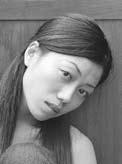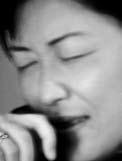Playwright Chong Mui-ngam
Director Lee Chun-chow
謝謝 With thanks to
演出長約2小時,不設中場休息
Running time: Approximately 2 hours with no interval
為了讓大家對這次演出留下美好的印象,請 切記在節目開始前關掉手錶、無綫電話及傳 呼機的響鬧裝置。會場內請勿擅自攝影、錄 音或錄影,亦不可飲食和吸煙,多謝合作。
To make this performance a pleasant experience for the artists and other members of the audience, PLEASE switch off your alarm watches, MOBILE PHONES and pagers. Eating and drinking, unauthorised photography and audio or video recording are forbidden in the auditorium. Thank you for your co-operation.
4-8.3.2009
香港大會堂劇院
封面設計 Cover design © Ketchup
封面照片 Cover photographs © Leo Yu (The Blue Hydrant)
香港藝術節委約及製作 Commissioned and produced by the Hong Kong Arts Festival
Playwright’s Notes
Feature: Questioning Our Existence 簡歷 Biographies
Playwright and Director
一個晴朗的早上,Ling等待着多年不 見的兒時鄰里Sammy的到訪。
Ling從香港移居至聖荷西十年,住在 人煙稀少的郊野山區,但與當地華人 並不投緣,所以一直渴望像Sammy這 樣的老朋友到訪。
Sammy來了,帶着港式的靈敏和幽 默,還有熟悉的回憶和真情,為Ling 和Tang平淡的生活帶來姿釆;然而 Sammy的美麗和熱情,也帶來久違了 的創傷和壓力,將潛藏在二人之間的 婚姻危機推至極點。
一個陌生的城市,三個異鄉人互揭底 牌所引致的殺人事件。
In the morning of a very fine day, Ling is waiting for her childhood neighbour Sammy, whom she has not seen for many years.
Ling moved to San José from Hong Kong ten years ago, and has been living in an isolated suburb. She does not mix well with the local Chinese community, and has been longing for visits from old friends like Sammy.
Sammy arrives, carrying with her sensitivity and humour very typical of Hong Kong people, as well as bringing memories and familiar sentiments. This brings some colour to the uneventful and insipid life of Ling and her husband Tang; but the beauty and passion of Sammy also causes pressure and opens up some old wounds. Her visit pushes the already troubled marriage of the couple to the verge of meltdown. This psychological thriller is about a murder, involving three outsiders in an unfamiliar city, that is incited by exposing each other’s weaknesses and secrets because of suspicion, jealousy and humiliation.
Translated by Vicky Leong
文:莊梅岩
正要為此下筆,看見電視播放着某荷 里活影片,講述一個角色如何意識到
自己將被推向死亡而千方百計尋找小 說家,請求她不要讓自己在故事中死 去。無獨有偶,筆下角色也曾懷着同
樣受創的心靈問我:
「不可以不死嗎?」
「如果我會變得更好呢?」
「不能繼續生存嗎?」
不同的是,我以沈默回應,讓時日過 去,用新的人和事,去忘卻那個失落 的靈魂。
今天,戲要上演了,再度面對那雙垂 詢的眼神,我很想告訴他,一個劇作 者狠下心腸去謀殺一個角色,未必為 了炫耀權力,未必為了成就寫作。有 時候,讓死亡帶來叩問,叩問本身就 是一種契機。
獻給 遺忘了存在的人們
Text: Chong Mui-ngam
Just as I was about to write this prologue, a Hollywood film playing on television caught my eye. It was about a character in a novel. When he sensed that the plot decreed his eventual death, he tried everything he could to make the author revise the manuscript. His predicament struck a chord with me as I too experience the same dilemma as a playwright. There was a time when I felt a character I created was asking me in a wounded tone:
“Do I really have to die?”
“What if I became a better person?”
“Would you let me live on?”
The only difference between the film I saw and my personal reaction was the response I chose silence. I let the days go by, embracing new people and things in order to forget that lament.
At long last, my play will be staged, and, once again I will be confronted by a pair of searching eyes. I really want to say that when a playwright hardens his heart to kill a character, it is not to flaunt his authority, or for the sake of achieving closure in his work. Sometimes, death provokes questioning, and questions bring opportunities.
This play is dedicated to those who have forgotten about existence.
Translated by Maggie Lee
Questioning Our Existence
文:潘詩韻
三屆香港舞台劇獎最佳劇本獎得主莊 梅岩去年自倫敦留學返港,交出的成 績單,是今屆香港藝術節的一部「驚 悚懸疑劇」,當中隱藏的玄機,令人 無不期待。
開始的時候,莊梅岩確實想朝懸疑的 方向創作,寫出跟她以往不同風格的 作品;不過,她很快就放棄了一般 「偵探故事」或荷里活式「懸疑」及 「驚悚」等公式,也沒有濺血、廝殺 或靈異鬼怪等官能上的驚悚剌激,也 沒有依循一般福爾摩斯的故事程式, 到處留痕,然後揭曉誰是兇手,即使 劇本包含了這些元素。無疑,劇名已 明示這是一宗謀殺案,不用賣關子, 也毋須暗藏提示。她最關注的始終是 人性,目標終站並非曲折離奇的情 節,而是人存在的意義與狀態:當人 被迫到絕境,對自身存在的意識與省 思自然深刻。
若在互聯網上搜尋「懸疑」、「驚悚」 的相關資料,你會發現此等概念往往 跟「存在主義」扯上關係。《聖荷西 謀殺案》透過兩夫婦與一個外來者的 關係,探討人「存在」的問題;只 是,莊梅岩不欲被任何典型標籤,也 期望觀眾以開放的態度欣賞作品,觀 照自身。
這次她找來曾跟她在《法吻》(2005 香港藝術節委約作品)中合作的資深 演員李鎮洲當導演,二人口徑一致, 「定義標籤彷彿將創作投在箱子裏, 觀者只會以固有既定的標準量度。」 李鎮洲說。從莊梅岩構思劇本到排練 的過程中,李鎮洲一直與她同行,
Text: Janice Poon
Chong Mui-ngam, a three-time winner of the Best Script Award at the Hong Kong Drama Awards, returned to Hong Kong last year after completing her studies in London, and produced the script of Murder in San José, a psychological thriller presented in this year’s Hong Kong Arts Festival. It is an intriguing theatre work full of suspense; the audience will watch with anticipation as its secrets unfold.
At first, Chong only wanted to create a work of suspense, to deviate from her previous works; but she soon abandoned the idea of writing standard “detective stories” or formulaic Hollywood “thrillers”. In Murder in San José she avoids the usual cheap thrills of blood and gore, massacre and mayhem and ghosts and demons. She does not follow the plot of a regular Sherlock Holmes story, leaving clues and traces everywhere, only to unveil the whodunit mystery at the end. Without a doubt, this drama is about a murder, as pointed out by the title. However, although the script contains elements of a traditional mystery, the playwright does not try to hold back secrets that will be later unveiled. Instead, things are laid out in the open.
In Murder in San José, Chong examines the issue of human existence through the relationship of a married couple and a visiting friend. If you search for relevant information on “suspense” and “thriller” on the Internet, you find that these two topics are always linked to the idea of “existentialism”. Chong’s concern and focus is human nature; her goal and what she tries to present is the meaning and the state of human existence. When people are put in extreme or desperate situations, they are naturally aware of their own existence which results in deeper self-reflection. Chong wants to avoid her work being labelled as stereotypical and she hopes the audience will look at her work with an open-mind. She also hopes that the work causes the audience to look into themselves at the same time. For this production, Chong invited veteran actor-director Lee Chun-chow, who collaborated with her in The French Kiss (a work commissioned by 2005 Hong Kong Arts Festival), to be the director. They

時而提着一盞明燈給她引路,時而掏 出一枝魔術棒,變出四兩撥千斤的舞 台調度;而李鎮洲則謙稱,他是來護 航的。
從圍讀劇本開始,李鎮洲便邀請莊梅 岩參與,以免他過分詮釋和演繹劇 本,或偏離劇本原來的軌道。「導演 和演員很容易會就文本構思許多過分 天馬行空、自以為美的處理,卻其實 是不必要的。」他反對導演該有絕對 詮釋劇本的自由,「一個導演很大程 度上是提供服務,作為劇本的護法, 保護劇本,令編劇原來的構思能在沒 有太大干擾下呈現,這是我擔任導演 時對自己的定位。」他相信編劇考慮 的是整體,而像他一樣從演員出身的 導演,很容易會執着一個自以為很好 的意念,擅自改動劇本,卻沒有顧及 每一分改動對上文下理的影響。他指 導演跟編劇的關係是合作伙伴,沒有 高低先後之分,因為劇本內的每一個 字,每一個標點符號都是編劇經過細 心思考才下筆,絕不隨意,有時候是 演繹者沒有仔細思考編劇的用意。
我們有理由期待,最終呈現在舞台的 演出,跟編劇莊梅岩的原意和想法非 常接近。
「直到現在也非常接近。」開排兩 周,莊梅岩跟李鎮洲已調較好整體的 演繹方向,接下來就是細排。「李鎮 洲說得對,寫劇本時我會很執着,每 一個字詞都經過反覆思考才會下筆; 至於最終成為怎樣的作品,我倒不太 執着,因為文本以外的戲劇語言,例 如燈光及佈景等,我是全權交由導演 指引。」她指導演、演員和設計師的 投入參與,令劇本提昇了。
在排練過程中,李鎮洲反覆聆聽角色 對話,故事發展,感受作品的聲音、 氣味、顏色與氛圍,當一切在腦海匯 聚成較清晰的圖像,便朝着這個方向
speak the same language and share the same thoughts, as we see in one of Lee’s comments: “Labelling is like putting a creative work in a box, causing the audience to measure and define your work according to established standards and values”.
In order to avoid over-interpretation and adding too many of his own comments, Lee asked Chong to attend all the rehearsals, starting from the initial readthrough session. Lee is very much against the idea of a director having absolute power or freedom over the interpretation of a script. “Directors and actors tend to be unbridled in their interpretations, having wonderful and fantastical ideas of how to handle their roles or the texts, but that is actually unnecessary”. He is convinced that, “a director is there to serve. He should be the custodian of the script, to be there to guard and protect it, so as to enable the original concepts of the script to be manifested without being compromised. This is my role as a director”. He believes the playwright looks at the script as a whole, and thinks of the overall structure. Meanwhile, an actor turned director is normally inclined to make changes in the script without taking into account how much it may affect the flow of the rest of the play. He points out that the relationship between a director and a playwright should be that of partners who work as equals. A scriptwriter chooses every word and punctuation mark with great care not a single word is written casually but sometimes the intention of the scriptwriter is overlooked by the people interpreting the play. It would be reasonable for us to expect the performance on stage to be something very close to Chong’s original intent and ideas. Two weeks after rehearsals started, Lee and Chong worked out an overall direction for interpreting the play. What came next was the finetuning. Chong stated, “what Lee Chun-chow said about me is very true. I am very meticulous when it comes to my script. Every single word I put in my script, I considered over and over again. But I don’t mind too much how my script is interpreted for other aspects of theatre, such as the set and lighting. I put them all into the hands of our director”. She had faith that the participation and involvement of the director, designers and actors would enhance the script.
During the rehearsal process, Lee paid attention to the dialogues between the characters and the development of the storyline. He tried to imagine the sounds, the smells, the colours and the atmosphere of the entire
組織排練。即使作為導演,他認為該 預留空間讓演員與設計師參與創作構 思,即使有時意念出乎意料。例如佈 景,原以為大部分情境都發生在廚房 裏,但佈景設計卻獨欠廚房,他花了 一整個晚上,一場一場思考該如何調 整處理,「大前提是我喜歡設計師提 出的設計。佈景設計跟編劇一樣,許 多細節都是整體考慮,都有其原因, 包括進出口的位置、顏色、橫樑、鏡 子等,不能隨意修改。若在調度上 遇上困難,我會在尊重設計師的前 提下,徵求他提出協調的方法。」於 是,觀眾得以觀賞到在沒有廚房設置 下,每一部份如何互動推進。
最終,他們在提供一個空間,一種留 白,不着跡也不刻意,讓觀眾感受劇 中人物的衝突與掙扎,更深刻省察自 身的存在意義與價值。李鎮洲相信, 莊梅岩的劇本,該可讓這種驚悚的氛 圍滲透出來,毋須刻意營造。

work. He would rehearse and work on the play only when everything came together in his mind. Although he was the director, he believed some creative space should be given to the performers and designers. For example, the original idea was to have most of the scenes taking place in the kitchen, but it turned out that there was no kitchen in the set designed. So, he spent one whole night rearranging everything, scene by scene. He explained, “I made that choice because I liked the idea proposed by the set designer. We worked on the set just as we had worked on the script. There were many aspects to consider, and we had to see things and the details in their entirety. Everything was there for a reason where to make the exits and entrances, the colours, the ceiling beams and the mirrors. When I encountered problems in the process, I asked the designer to make some adjustments, but my concern was to respect the designer and his ideas”. And now the audience will watch the interactions and the progress of the play in a set with no kitchen.
In the end, the set leaves room for our imaginations without being too obvious. The audience will feel the conflicts and struggles of the characters, arousing a greater awareness of the meaning and value of their own existence. The director believes that a good script naturally creates such effects, and no deliberate effort is required.
Translated by Vicky Leong
His works in Hong Kong include Amadeus, Pajama for Six and The Unexpected Man (2006 Hong Kong Arts Festival), He directed The Duchess of Malfi last year at HKAPA. His international performances include Man Oh Man, Closer, Theatre Sans Animaux, Rocky Horror Picture Show, The Vagina Monologues, Time Flies, The Woman in Black and Frankenstein.
彭秀慧 Kearen Pang
Sammy
彭秀慧為近年最具號召力的劇場創作女演員之一,亦為本地少有集編、導、演、 教於一身的跨媒體藝術工作者。
2004年獲香港戲劇協會獎學金到巴黎Studio Magenia研習默劇及形體劇場,回港 後積極與不同藝團於不同媒介合作,從表演到創作到行政工作皆見其蹤影。 2005年起,彭秀慧以Kearen Pang Production名義編導及製作三個受歡迎個人劇場作品,包括 《29+1》、《再見不再見》及《不眠優伶》;憑藉其糅合文本、形體及音樂的獨腳表演形色,三個劇 目先後公演八次,累積了逾二萬五千觀眾人次,並憑《再見不再見》獲香港舞台劇獎最佳女主角( 喜/鬧劇)。
文字創作方面,彭秀慧首個電影劇本作品為柏林銀熊獎得獎電影《伊莎貝拉》,並撰寫其電影小 說。亦曾出版其個人劇場作品創作集《再見不再見 看見.故事》。
喜歡創作,相信身體文字影像音樂,只為滿足探索和分享的慾望。
http://hk.myblog.yahoo.com/kearenpang
Kearen Pang is a multimedia producer, scriptwriter, director and actress. Her repertoire includes theatre works, movies and books. She was a full-time actress at Chung Ying Theatre Company where she played leading roles in many productions. In 2004, she received a scholarship from Hong Kong Federation of Drama Societies to study pantomime and movement theatre in Studio Magenia, Paris. After returning to Hong Kong, she began to produce her own theatre productions under the name of Kearen Pang Production. In the past three years she has created and performed popular works including 29+1, Goodbye but Goodbye and Sleepless Potatoes. She was awarded the Best Actress Award (Comedy/Farce) at the Hong Kong Drama Awards for her performance in Goodbye but Goodbye. Her first movie script, Isabella (directed by Pang Ho-cheung), won the Silver Berlin Bear at the Berlin International Film Festival. She subsequently wrote a novel based on the film. In addition, she has published her own theatre collection, Goodbye but Goodbye.
張鯽米 Jimmy Zhang
明哥 Ming
張鯽米1994年開始參與多個不同表演團體的製作,包括百樂門劇團、臨界點劇象 錄、九歌兒童劇團、差事劇團、瘋狂劇場、五節芒劇團、上海草台班劇團、角落 兒童劇團以及法國盲點劇團等。
張鯽米現為劇場自由工作者、每週看戲俱樂部編輯(http://mjkc.tw),並擔任大 學戲劇社指導老師。
Since 1994, Jimmy Zhang has participated in productions with various organisations, including The Door Group, Critical Point Theater Phenomenon, Assignment Theatre Group, Crazy Theatre Group, Silvergrass Theatre, Nook Drama and Theatre du Point Aveugle.
Zhang is a freelance theatre practitioner, webpage editor at http://mjkc.tw, and instructor at university drama societies.












